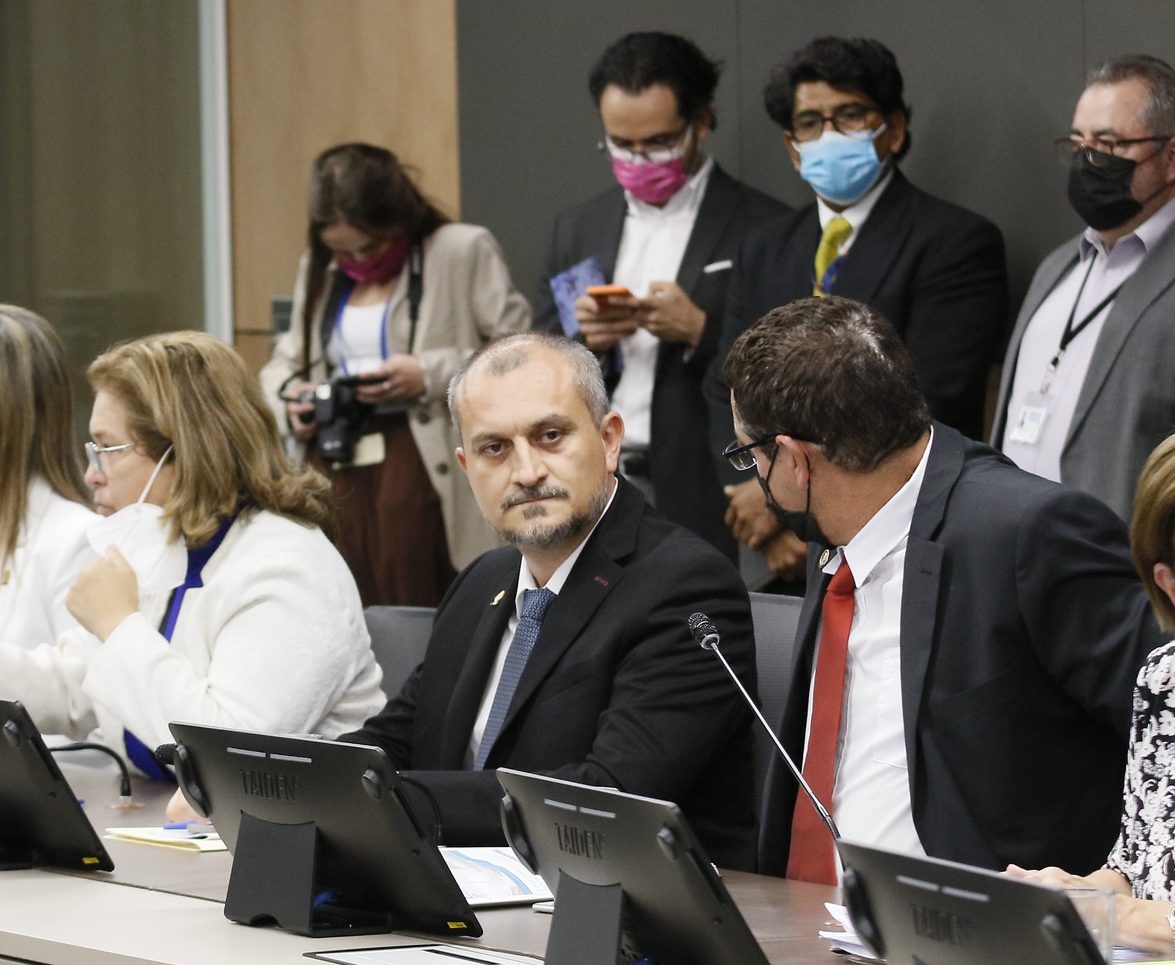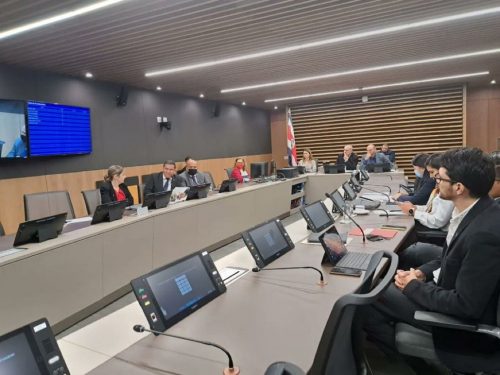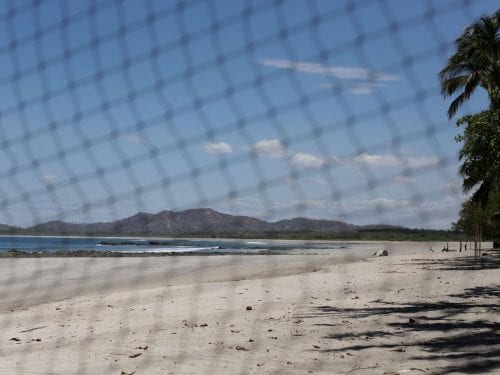
Legislator Daniel Vargas is still getting used to the cooler weather in San Jose in the Legislative Assembly, after living for more than a decade in his native Nicoya working in his family business. He’s also still adapting to the national political scene, where he has a role for the first time as part of the team that helped gain economist Rodrigo Chaves the presidency.
Of course, Vargas isn’t a stranger in politics. In 2020, he participated as a candidate for mayor of Nicoya for the Alliance for Nicoya Coalition, hand in hand with his local movement Party of Nicoya, the Broad Front and the Citizen Action Party (PAC). At that time, he turned out to come in fourth place among the candidates with the most votes.
After the elections, he continued participating in citizen commissions within the municipality and, a year later, in 2021, he began working with the Social Democratic Progress Party (PPSD for the Spanish acronym) as the first place candidate for Guanacaste.
Daniel Vargas was the last legislator to be officially named by the Supreme Electoral Tribunal (TSE for the Spanish acronym). He won the seat over the Christian Social Unity candidate Bismarck Villegas by just two votes.
He affirms that he won’t be a “legislator from the lowland” and that his projects won’t be focused solely for the benefit of his canton or the province, but for the entire country. During his tenure, Vargas hopes to create projects to reduce unemployment in coastal areas and employ a plan to restructure business loans.
In this interview, the legislator talked about what his position will be in the Assembly as a legislator from the ruling party, he outlined what his projects are for the province and discussed what his relationship with the new president, Chaves, is like.
You belong to the faction that’s in office. How will this position influence your way of legislating?
I think that in my case, it facilitates communication. I have a good relationship with Mr. Rodrigo and I hope to have it with his general cabinet. I must say that there are many names that I don’t know, but well, we’ll get to know them. In short, I believe that belonging to the same political bloc [as the government] creates differentiated channels in a way that we can speak to each other on closer terms.
During the campaign, you constantly mentioned that you’d work on projects to reduce unemployment in the province. What plans do you have to make this a reality within your caucus?
That’s something that has to be worked on from many fronts, and I think the advantage is that the executive branch is clear about it. They know that the issue of simplifying procedures is essential in all the initiatives they pursue. We’re going to start working closely with our fellow legislators from Guanacaste and with the mayors of Guanacaste.
What ideas from the executive branch resonate most with your work plan as legislator?
The ideas that the executive branch presents in its government plan and those that we in the caucus are promoting are very close. They’re very aligned. What I think we have to define together, with the body of mayors of Guanacaste and with fellow legislators, is what actions we’re going to attend to in a scheduled manner over time. Analyze if there are some critical needs, medium-skilled and other low-skilled ones and how we’re going to apply them in a four-year period.
Most of the votes from Guanacaste in the second round went to the representative from your party. How will your work team shoulder this vote of confidence at the moment of legislating?
The support we got should be seen as a voice of protest from the three rural and coastal provinces of this country to be given more attention.
We have to work then to deconcentrate production and power. I also believe that bringing more population to rural and coastal areas would give us even greater representation in Congress and we could work from greater parliamentary equality, thinking about how the provinces can have more balanced representation in decision-making at the national level.
In January of this year, you told us that beyond creating bills, the assembly should be more concerned with reviewing whether the ones that exist are functional for the province. What are the next steps in this type of project that is committed to economic revival?
We need to define what particular actions we can promote from the executive branch, from the assembly and from local governments, in the sense of fostering among everyone actions that seek to meet the great needs of Guanacaste and be able to position an ambitious project that really gives us a starting point, for something that will take us, not four years, probably eight, twelve or more. Build it in such a way that over time, we can also see advances and improvements in different lines. I think that is the main thing.
And how would you get your ruling party caucus to support you in this?
In the caucus, they are clear that rurality isn’t the same as the urban part. They are also aware that we have to handle differently what is Guanacaste or Puntarenas, Limon, that we’ve seen left behind in social and economic indicators. So I have no doubt that the caucus is going to be a point of support for the initiatives that we can propose from Guanacaste to improve the population’s quality of life.
During the campaign, you mentioned that it was important to make more of a point in the international environment and ask for a little more recognition of the effort that Costa Rica makes in climate matters. Is there some type of environmental project for Guanacaste within the assembly that you intend to support?
No, but you have to learn to now how times are. We have to look at the way that the developed countries are also making a lot of agreements and are making or redefining their directions. I think we have to start talking about a blue economy in this country and especially for Guanacaste: environment but that gives priority to the economy. We’re going to have to dig deeper into that concept.
How have the first approaches been developed with the other three legislators who now accompany you in representing the province? How have those connections, alliances and conversations that you’ve had been?
After the campaign, we’ve come together well. I have a really good relationship with all three. They seem like good people to me, they seem like people who listen, which is extremely important for teamwork, and I’m more than convinced that we can maintain those open ties of those close communication channels so that together, we can obtain better conditions for Guanacaste.
There are two legislators representing Nicoya. From your position, how can you attract projects for the benefit of the canton?
I believe that it allows us to have a much better understanding of the reality of the peninsula. However, the four of us are legislators first from the Republic and second from Guanacaste. As I got together with all of the cantons, I let them know that I’m not going to be a legislator [just] from the lowland. And in this sense, we’ll work so that all the cantons of the province can also achieve their dreams, satisfy their needs and be heard. As I repeat, I believe that the knowledge we have of Nicoya and this can make things a little easier. However, I think the closeness that I intend to have with the province will bring me closer to the particularities of each canton.







Comments